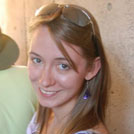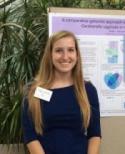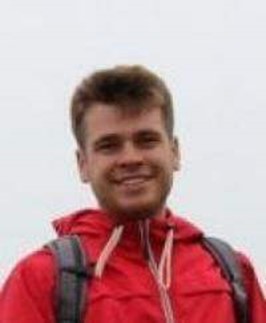Dr. Emma Allen-Vercoe
I began my research career with undergraduate and graduate studies at the Central Veterinary Laboratories (now Veterinary Laboratories Agency) and the Centre for Applied and Microbiological Research (CAMR, now the Health Protection Agency), UK, under the direction of Prof. Martin Woodward. There, I studied the enteric pathogen Salmonella enterica serovar Enteritidis, and developed a sound appreciation of the many obstacles that a enteric pathogen must overcome in the gut in order to cause disease. I became fascinated by the huge arsenal of virulence factors required by enteric pathogens in order to survive and proliferate in the gut environment.
I spent a brief postdoctoral period at CAMR, learning to work with technically challenging pathogens such as Mycobacterium tuberculosis and Campylobacter jejuni, before I relocated to Canada in 2001 to start a postdoctoral position at the University of Calgary, under the joint direction of Drs. Rebekah DeVinney and Mike Surette. Here I worked on Enteropathogenic and Enterohemorrhagic E. coli (EPEC and EHEC), using cell and molecular biology techniques to probe the fascinating interactions of their type III secretion systems with host cells.
I had always been interested in learning more about the normal microbial population inside the human gut, and in 2004 I was fortunate enough to win a Fellow-to-Faculty Transition award through the Canadian Association of Gastroenterology. This award allowed me to develop an independent research program aimed at the study of the normal human microbiota and its influence on human health and disease, a program that I brought with me to Guelph in December 2007.
Since I’ve been here, with thanks to my very talented staff and students I have built a world-class anaerobic microbiology facility and directed it both towards answering fundamental research questions, and to create translational opportunities to move the science into the clinic. In 2013, I co-founded NuBiyota, a company whose mission is to develop “Microbial Ecosystem Therapeutics” to treat disorders that have gut microbial dysbiosis as a root cause.
My motto: "My microbes told me to do it"
My hobbies: Gardening, reading, reading about gardening
- B.Sc. (Hons) Biochemistry, University of London
- Ph.D. Molecular Biology, Open University in conjunction with CAMR, UK
- Post-doctoral fellow, University of Calgary
Research in my laboratory is focused on the study of the normal human gut microbiota, both in disease and in health. The research can be loosely divided into several main areas centered on fundamental questions in the field of microbial ecology of the gut:
WHAT GROWS THERE?
The microbial world inside the human gut, though not without an intrinsic 'ick' factor, is a fascinating place, brimming with diversity on an enormous scale, but yet very poorly understood. While molecular signatures have shown that the microbiota community within the gut can contain many hundreds of bacterial species, only a small percentage of these species are understood in terms of their biology. The lack of knowledge in this area stems from the fact that, as yet, the conditions required to culture most of the bacterial species resident in the human gut are not well understood. In my laboratory, we are developing new techniques to culture and study novel bacterial species from the gut in order to better understand how these species might contribute to the remarkable homeostasis of the microbiota community as a whole. Central to our research approach, we have developed a continuous culture system to model the bacterial communities within the distal gut, the most densely populated part of the human body in terms of microbes. Dubbed the Robogut, our model contributes to many of the projects within the lab. Click this link to see a recent piece featuring this work on CBC's Quirks and Quarks' radio show. Click this link to see members of my lab explain the system in detail.
We have enjoyed an extensive collaboration with the Broad Institute in Cambridge, Massachusetts, whereby we have provided a significant number of the bacterial isolates requested for genome sequencing through the Human Microbiome Project. We remain working closely with elements of this project, including the production of microbiological standards for HMP sequencing projects.
HOW DOES THE GUT MICROBIOTA RESPOND TO ITS ENVIRONMENT?
We are interested in the metabolic output of the gut microbiota and how this changes in response to environmental stimuli. We are interested in the response of the gut microbiota to drugs, food additives, and host proteins. We have developed NMR as a tool for shotgun metabolomics of microbial ecosystems to help us understand metabolic shifts in response to microbiota perturbation. We currently apply this approach to the study of several diseases, including type 1 diabetes, colorectal cancer and IBD.
We are also interested in the role of the virobiome – the viral microbiome, in intestinal health. Viruses are the most numerous components of the human gut microbiome, but their role in ecosystem development and dynamics is not well understood. The Robogut system offers us the perfect opportunity to study the interaction of the virome with the cellular components of the gut microbial ecosystem.
WHICH BACTERIAL SPECIES OF THE NORMAL MICROBIOTA CAN CONTRIBUTE TO HEALTH/DISEASE?
In a healthy person, despite the constantly changing environment within the gut, the resident microbiota maintain a largely homeostatic balance that is unique to the host. It is becoming increasingly clear that when this balance is shifted, the consequences to the host can be highly detrimental. My lab studies several key diseases with connections to the gut microbiota: Colorectal cancer, Type 1 and Type 2 diabetes.
BEYOND THE HUMAN MICROBIOTA
We are also applying our knowledge gained from study and culture of the human gut microbiota to the honey bee gut microbiota, since we believe that the issues associated with interference of the balance of the gut microbiota extend also to insects, and that our understanding of the human gut microbiota will help us to approach the problem of the recent and unsustainable losses of pollinators in the environment.
CURRENT PROJECTS WITHIN THE LAB
Colorectal cancer is one of the leading forms of cancer in the world. In 2011, in collaboration with the BC Cancer Agency, our lab helped to demonstrate the overabundance of a particular anaerobic species, Fusobacterium nucleatum, in colorectal cancer tumours. This fascinating finding has opened the door to many further studies that are now underway to try to characterize the role that this enigmatic species may have in disease. In my lab, we are focused on understanding how F. nucleatum interacts with host cells to cause disease, and how this process is affected by factors such as host diet, existing microbiome and antibiotic use. We are also focusing our efforts on characterization of another suspectedoncomicrobe, Parvimonas micra, which shows some fascinating correlations withF. nucleatumincolorectal cancer.
Type 1 and Type 2 Diabetes (T1D and T2D). T1D is a serious metabolic disease where the body has difficulty in regulating blood sugar levels, as a result of the pancreas producing insufficient amounts of insulin. There is a growing amount of evidence that the gut microbiota plays an important role in the development of T1D. In particular, exposure to certain microbial species found in the gut may trigger an autoimmune response to the insulin-producing cells of the pancreas in susceptible individuals. T2D is an acquired metabolic disease where the pancreas becomes less efficient at producing insulin, and cells respond poorly to the insulin that is produced. This disease was once thought to be associated only with older onset, but increasingly younger people are now suffering from this disease. T2D also seems to be associated with a less diverse gut microbiome. Our lab is working in collaboration with the lab of Jayne Danska, Sick Kids, to try to understand how, and which, gut microbes contribute to diabetes of both types.
What are the consequences of our "missing microbiota"?
It is generally accepted that humans in the western world are colonized by a less diverse ecosystem than those of people who live without modern conveniences, such as hunter-gatherer tribespeople. We are interested to understand what is different about the hunter-gatherer gut microbiome in terms of the metabolism of the ‘missing microbes’ by culturing and studying these species, and determining how they respond to different dietary substrates, both as single strains as well as within whole ecosystems. We havea particular interest in the microbes associated with people from the Yanomami people of the Amazon, agroup of people who live in villages across a gradient of urbanization. As well as culturing andcharacterizing these enigmatic microbes, we have a strong interest in developing new bioethical paradigmsfor working with indigenous cultures and their microbiomes, to ensure equitable benefits for all.
Understanding the honey bee microbiome
A new and very exciting area for the lab is the study of the honey bee (Apis mellifera) microbiome. There is currently a decline in the fitness of honey bee colonies that is leading to overwintering losses in Canada that are unsustainable. Just as for humans, the honeybee gut microbiome is critical for health. We are working to determine whether manipulating the honey bee gut microbiome may increase their fitness through multiple experiments and models that use microbial culture as central components. As well, we have pioneered the Canadian Bee Gut Project, a Food from Thought-funded initiative to map honey bee gut microbiomes across Canada, to help us understand the landscape of this important microbial ecosystem and how it correlates with bee health in the face of different environmental pressures. We are also characterizing isolated bacteria fromhoney bees and bumble bees (Bombus impatiens), and testing themicrobiome profiles of honey bee queens imported to Canada from other countries.
- *Cancer Research UK (CRUK)
- *National Institutes of Health, (NIH)
- *Food From Thought Thematic Research Fund III
- *Canadian Institutes of Health Research, (CIHR)
- *Canadian Foundation for Innovation, (CFI)
- *Ontario Ministry of Agriculture, Food and Rural Affairs, (OMAFRA)
- *Canada Research Chairs Program
- Natural Sciences and Engineering Research Council (NSERC)
- The Juvenile Diabetes Research Institute (JDRF)
- Pulse Crops (Canada) Association
- The Canadian Cancer Research Institute
- Crohn's and Colitis Canada, (CCC)
- US Department of Defense Congressionally Directed Medical Research Program (CDMRP)
- Physician’s Services Incorporated (PSI)
- The Southeastern Ontario Academic Medical Organization (SEAMO)
- Ontario Ministry of Research and Innovation, (OMRI)
- Ontario Centres of Excellence (OCE)
- The Autism Research Institute
Past and *Present
Publications (since 2019)
* indicates EAV lab member
- *Wilde J, Boyes R, *Robinson AV,*Daisley BA,*Botschner AJ,*Brettingham DJL,*Macpherson CV, *Mallory E, Allen-VercoeE. Assessing phage-host populationdynamics by reintroducing virulent viruses to synthetic microbiomes. Cell Host Microbe2024 32(5): 768-778.
- *Quinn MW, *Daisley BA, *Vancuren SJ, *Bouchema A, Niño E, Reid G, ThompsonGJ, Allen-Vercoe E. 2024.Apirhabdus apintestinigen. nov, sp. nov., a member of anovel genus of the family Enterobacteriaceae, isolated from the gut of the western honeybeeApis mellifera. Int J Syst Evol Microbiol. 2024 74(4): 006346.
- Douchant K, He SM, Noordhof C, Greenlaw J, *Vancuren S, *Schroeter K, Allen-Vercoe E, Sjaarda C, Vanner SJ, Petrof EO, Sheth PM, Guzman M Commun Biol 20247(1) 135.*Elder R, *Vancuren SJ, *Botschner AJ, Josephy PD, Allen-Vercoe E. Anaerobe 202383: 102783.
- Pay R, Sharrock AV, *Elder R, Maré A, Bracegirdle J, Torres D, Malone N, Vorster J,Kelly L, Ryan A, Josephy PD, Allen-Vercoe E, Ackerley DF, Keyzers RA, Harvey JE.Food Chem Toxicol 2023 182: 114193.
- Sulit AK, *Daigneault M, Allen-Vercoe E, Silander OK, Hock B, McKenzie J, Pearson J,Frizelle FA,Schmeir S, Purcell R. NPJ Biofilms Microbiomes 2023 9(1): 59.
- *Robinson AV and Allen-Vercoe E. Strain specificity in fusobacterial co-aggregationwith colorectal cancer relevant species. Anaerobe 2023 82: 102758.
- Rodriguez MA, Fernández LA,*Daisley BA,Reynaldi FJ, Allen-Vercoe E, Thompson GJ. Probiotics and in-hive fermentation as a source of beneficial microbes to support thegut microbial health of honey bees. J Insect Sci 202323(6) 19
- *Daisley BA, Pitek AP, Torres C, Lowery R, Adair BA, Al KF, Niño B, Burton JP, Allen-Vercoe E, Reid G, Niño E. Delivery mechanism can enhance probiotic activityagainst honey bee pathogens. ISME J 2023 17(9): 1382-1395.
- Josephy PD and Allen-Vercoe E. Reductive metabolism of azo dyes and drugs:Toxicological implications. Food Chem Toxicol 2023 Aug 178:113932.
- Rooney A, *Cochrane K, Fedsin S, Yao S, Anwer S, Dehmiwal S, Hota S, Poutanen S, Allen-Vercoe E, and Coburn B. A microbial consortium alters intestinal Pseudomonadota and antimicrobial resistance genes in individuals with recurrent Clostridioides difficile infection. MBio, 2023 14 (4): e0348222.
- Allen-Vercoe E., *Daigneault MC, *Vancuren SJ, *Cochrane K, O’Neal LL, Sankaranarayanan, K and Lawson PA. Holtiella tumoricola gen. nov. sp. nov., isolated from a human clinical sample. IJSEM, 73(7).
- *Daisley BA, Pitek AP, *Mallory E, Chernyshova AM, Allen-Vercoe E, Reid G, Thompson GJ Disentangling the microbial ecological factors impacting honey bee susceptibility to Paenibacillus larvae infection. Trends Microbiol. 2023 May;31(5):521-534.
- *Wilde J, Allen-Vercoe E. Characterizing prophages in the genus Fusobacterium. Anaerobe. 2023 Apr;80:102718.
- *Gianetto-Hill CM, *Vancuren SJ, *Daisley B, *Renwick S, *Wilde J, *Schroeter K, *Daigneault MC, Allen-Vercoe E. The Robogut: A Bioreactor Model of the Human Colon for Evaluation of Gut Microbial Community Ecology and Function. Curr Protoc. 2023 Apr;3(4):e737.
- Frame NW, Allas MJ, Pequegnat B, Vinogradov E, Liao VC, Al-Abdul-Wahid S, Arroyo L, Allen-Vercoe E, Lowary TL, Monteiro MA. Structure and synthesis of a vaccine and diagnostic target for Enterocloster bolteae, an autism-associated gut pathogen - Part II. Carbohydr Res. 2023 Apr;526:108805.
- Spreafico A, Heirali AA, Araujo DV, Tan TJ, Oliva M, Schneeberger PHH, Chen B, Wong MK, Stayner LA, Hansen AR, Saibil SD, Wang BX, *Cochrane K, *Sherriff K, Allen-Vercoe E, Xu W, Siu LL, Coburn B. First-in-class Microbial Ecosystem Therapeutic 4 (MET4) in combination with immune checkpoint inhibitors in patients with advanced solid tumors (MET4-IO trial). Ann Oncol. 2023 Mar 1:S0923-7534(23)00088-1.
- *Ruiz-Rico M, *Renwick S,* Vancuren SJ, *Robinson AV, *Gianetto-Hill C, Allen-Vercoe E, Barat JM. Impact of food preservatives based on immobilized phenolic compounds on an in vitro model of human gut microbiota. Food Chem. 2023 Mar 1;403:134363.
- Petrick HL, Ogilvie LM, Brunetta HS, *Robinson A, Kirsh AJ, Barbeau PA, Handy RM, Coyle-Asbil B, *Gianetto-Hill C, Dennis KMJH, van Loon LJC, Chabowski A, Schertzer JD, Allen-Vercoe E, Simpson JA, Holloway GP. Dietary nitrate and corresponding gut microbiota prevent cardiac dysfunction in obese mice. Diabetes. 2023 Feb 22:db220575.
- Vogt SL, Serapio-Palacios A, Woodward SE, Santos AS, de Vries SPW, Daigneault MC, Brandmeier LV, Grant AJ, Maskell DJ, Allen-Vercoe E, Finlay BB. Enterohemorrhagic Escherichia coli responds to gut microbiota metabolites by altering metabolism and activating stress responses. Gut Microbes. 2023 Jan-Dec;15(1):2190303.
- MacNicol JL, *Renwick S, *Ganobis CM, Allen-Vercoe E, Weese JS, Pearson W. The influence of a probiotic/prebiotic supplement on microbial and metabolic parameters of equine cecal fluid or fecal slurry in vitro. J Anim Sci. 2023 Jan 3;101:skad034.
- Pellegrino GM, Browne TS, Sharath K, Bari KA, *Vancuren SJ, Allen-Vercoe E, Gloor GB, Edgell DR. Metabolically-targeted dCas9 expression in bacteria. Nucleic Acids Res. 2023 Jan 25;51(2):982-996.
- MacNicol JL, *Renwick S, *Ganobis CM, Allen-Vercoe E, Weese JS, Pearson W. A Comparison of Methods to Maintain the Equine Cecal Microbial Environment In Vitro Utilizing Cecal and Fecal Material. Animals (Basel). 2022 Aug 8;12(15):2009.
- Attai H, *Wilde J, Liu R, Chopyk J, Garcia AG, Allen-Vercoe E, Pride D. Bacteriophage-Mediated Perturbation of Defined Bacterial Communities in an In Vitro Model of the Human Gut. Microbiol Spectr. 2022 Jun 29;10(3):e0113522.
- *Ruiz-Rico M, *Renwick S, *Vancuren SJ, *Robinson AV, *Gianetto-Hill C, Allen-Vercoe E, Barat JM. Influence of free and immobilized chitosan on a defined human gut microbial ecosystem. Food Res Int. 2022 Nov;161:111890.
- *Ruiz-Rico M, *Renwick S, Allen-Vercoe E, Barat JM. In vitro susceptibility of human gut microbes to potential food preservatives based on immobilized phenolic compounds. Food Chem. 2022 Jun 1;378:132136.
- Despins CA, Brown SD, *Robinson AV, Mungall AJ, Allen-Vercoe E, Holt RA. Modulation of the Host Cell Transcriptome and Epigenome by Fusobacterium nucleatum.mBio. 2021 Oct 26;12(5):e0206221.
- Pauer H, Teixeira FL, *Robinson AV, Parente TE, De Melo MAF, Lobo LA, Domingues RMCP, Allen-Vercoe E, Ferreira RBR, Antunes LCM.Bioactive small molecules produced by the human gut microbiome modulate Vibrio cholerae sessile and planktonic lifestyles. Gut Microbes. 2021 Jan-Dec;13(1):1-19.
- Kao D, Wong K, Franz R, *Cochrane K, *Sherriff K, Chui L, Lloyd C, Roach B, Bai AD, Petrof EO, Allen-Vercoe E. The effect of a microbial ecosystem therapeutic (MET-2) on recurrent Clostridioides difficile infection: a phase 1, open-label, single-group trial. Lancet Gastroenterol Hepatol. 2021 Apr;6(4):282-291
- *Renwick S, *Ganobis CM, *Elder RA, *Gianetto-Hill C, *Higgins G, *Robinson AV, *Vancuren SJ, *Wilde J, Allen-Vercoe E. Culturing Human Gut Microbiomes in the Laboratory. Annu Rev Microbiol. 2021 Oct 8;75:49-69.
- Bayer G, *Ganobis CM, Allen-Vercoe E, Philpott DJ. Defined gut microbial communities: promising tools to understand and combat disease. Microbes Infect. 2021 Jul-Aug;23(6-7):104816.
- Starke R, *Oliphant K, Jehmlich N, Schäpe SS, Sachsenberg T, Kohlbacher O, Allen-Vercoe E, von Bergen M. Tracing incorporation of heavy water into proteins for species-specific metabolic activity in complex communities. J Proteomics. 2020 Jun 30;222:103791.
- Bisanz JE, Soto-Perez P, Noecker C, Aksenov AA, Lam KN, Kenney GE, Bess EN, Haiser HJ, Kyaw TS, Yu FB, Rekdal VM, Ha CWY, Devkota S, Balskus EP, Dorrestein PC, Allen-Vercoe E, Turnbaugh PJ. A Genomic Toolkit for the Mechanistic Dissection of Intractable Human Gut Bacteria. Cell Host Microbe. 2020 Jun 10;27(6):1001-1013.e9.
- *Oliphant K, *Cochrane K, *Schroeter K, *Daigneault MC, *Yen S, Verdu EF, Allen-Vercoe E.Effects of Antibiotic Pretreatment of an Ulcerative Colitis-Derived Fecal Microbial Community on the Integration of Therapeutic Bacteria In Vitro. mSystems. 2020 Jan 28;5(1):e00404-19.
- Prudhomme N, *Gianetto-Hill C, Pastora R, Cheung WF, Allen-Vercoe E, McLean MD, Cossar D, Geddes-McAlister J. Quantitative proteomic profiling of shake flask versus bioreactor growth reveals distinct responses of Agrobacterium tumefaciens for preparation in molecular pharming. Can J Microbiol. 2021 Jan;67(1):75-84.
- *Cochrane K, *Robinson AV, Holt RA, Allen-Vercoe E. A survey of Fusobacterium nucleatum genes modulated by host cell infection. Microb Genom. 2020 Feb;6(2):e000300
- Lohmann P, Schäpe SS, Haange SB, *Oliphant K, Allen-Vercoe E, Jehmlich N, Von Bergen M.Function is what counts: how microbial community complexity affects species, proteome and pathway coverage in metaproteomics. Expert Rev Proteomics. 2020 Feb;17(2):163-173.
- Pradhananga S, Tashtush AA, Allen-Vercoe E, Petrof EO, Lomax AE. Protease-dependent excitation of nodose ganglion neurons by commensal gut bacteria. J Physiol. 2020 Jun;598(11):2137-2151.
- *Ganobis CM, Al-Abdul-Wahid MS, *Renwick S, *Yen S, *Carriero C, Aucoin MG, Allen-Vercoe E. 1D 1 H NMR as a Tool for Fecal Metabolomics. Curr Protoc Chem Biol. 2020 Sep;12(3):e83.
- Mistry P, Reitz CJ, Khatua TN, Rasouli M, *Oliphant K, Young ME, Allen-Vercoe E, Martino TA. Circadian influence on the microbiome improves heart failure outcomes. J Mol Cell Cardiol. 2020 Dec;149:54-72.
- Allen-Vercoe E, Coburn B. A Microbiota-Derived Metabolite Augments Cancer Immunotherapy Responses in Mice.
- Cancer Cell. 2020 Oct 12;38(4):452-453.
- Wylensek D, Hitch TCA, Riedel T, Afrizal A, Kumar N, Wortmann E, Liu T, Devendran S, Lesker TR, Hernández SB, Heine V, Buhl EM, M D'Agostino P, Cumbo F, Fischöder T, Wyschkon M, Looft T, *Parreira VR, Abt B, Doden HL, Ly L, Alves JMP, Reichlin M, Flisikowski K, Suarez LN, Neumann AP, Suen G, de Wouters T, Rohn S, Lagkouvardos I, Allen-Vercoe E, Spröer C, Bunk B, Taverne-Thiele AJ, Giesbers M, Wells JM, Neuhaus K, Schnieke A, Cava F, Segata N, Elling L, Strowig T, Ridlon JM, Gulder TAM, Overmann J, Clavel T. A collection of bacterial isolates from the pig intestine reveals functional and taxonomic diversity. Nat Commun. 2020 Dec 15;11(1):6389.
- *Cochrane, K., *Robinson, A., Holt, RA, Allen-Vercoe E., A survey of Fusobacterium nucleatum genes modulated by host cell infection. Microbial Genomics 2019 6(2):e000300.
- *Oliphant K, *Parreira VR, *Cochrane K, Allen-Vercoe E. Drivers of human gut microbial community assembly: coadaptation, determinism and stochasticity. ISME J. 2019 Sep 2. doi: 10.1038/s41396-019-0498-5
- Allen-Vercoe E, Carmical JR, Forry SP, Sinha R, Gail MH. Perspectives for Consideration in the Development of Microbial Cell Reference Materials. Cancer Epidemiol Biomarkers Prev. 2019 Sep 12. pii: cebp.0557.2019. doi: 10.1158/1055-9965.EPI-19-0557.
- *Watkins C, Murphy K, *Yen S, Carafa I, Dempsey EM, O' Shea CA, Allen-Vercoe E, Ross RP, Stanton C, Ryan CA. Effects of therapeutic hypothermia on the gut microbiota and metabolome of infants suffering hypoxic-ischemic encephalopathy at birth. Int. J. Biochem. Cell Biol. 93 2017, 110-118
- *Oliphant K, Allen-Vercoe E. Macronutrient metabolism by the human gut microbiome: major fermentation by-products and their impact on host health. Microbiome. 2019;7(1):91. doi: 10.1186/s40168-019-0704-8.
- Hold GL, Allen-Vercoe E. Gut microbial biofilm composition and organisation holds the key to CRC. Nat Rev Gastroenterol Hepatol. 2019 ;16(6):329-330. doi: 10.1038/s41575-019-0148-4.
- Paun A, Yau C, Meshkibaf S, *Daigneault MC, Marandi L, Mortin-Toth S, Bar-Or A, Allen-Vercoe E, Poussier P, Danska JS. Association of HLA-dependent islet autoimmunity with systemic antibody responses to intestinal commensal bacteria in children. Sci Immunol. 2019 Feb 1;4(32). pii: eaau8125. doi: 10.1126/sciimmunol.aau8125.
- *Carlucci C, *Jones CS, *Oliphant K, *Yen S, *Daigneault M, *Carriero C, *Robinson A, Petrof EO, Weese JS, Allen-Vercoe E. Effects of defined gut microbial ecosystem components on virulence determinants of Clostridioides difficile. Sci Rep. 2019 Jan 29;9(1):885. doi: 10.1038/s41598-018-37547-x
Link to complete set of publications: https://www.ncbi.nlm.nih.gov/pubmed/?term=llen-vercoe
Availability of microbial strains
The lab is often asked for stocks of microbial strains that have been deposited to the HMP reference genome collection (and that are not available through BEI Resources), or that are otherwise available in our considerable library of gut and oral microbial isolates. We are very happy to help, although the work has increased in volume in recent years. Therefore, we now ask that our requestors contribute to the cost of the preparation and QC of outgoing strains. Our standard cost is CAD$250 per strain (or CAD$500 to 'for profit' enterprise), as well as the cost of shipping. Requestors are responsible for acquisition of any import permits, as required. Some strains may be subject to the execution of a Materials Transfer Agreement (MTA) between the University of Guelph and the requestor's institution. Please address any questions about strain availability/MTA execution to Dr. Allen-Vercoe (eav@uoguelph.ca). Please note that many strains within our collection are fastidious anaerobes and require specific conditions for culture. gDNA can be prepared on request.
Coming soon: MiPAC is a new facility that is currently being launched as a centre for microbialculturomicsat the University of Guelph, under the direction of Dr. Allen-Vercoe. If you have asample from which you would like a specific microbe, or untargeted microbial community members cultured, please contact Dr. Allen-Vercoe for details of this exciting new service!

Jackie Strauss
Congratulations to Jackie Strauss, Ph.D. September 2011!
Jackie's project was focused on understanding the role of the anaerobic pathogen, Fusobacterium nucleatum, in the etiology of IBD.

Julie McDonald
Congratulations to Julie McDonald, PhD. May 2013!
Julie's project focused on developing the Roboguts as a model of the human distal gut microbial ecosystem. Her project also examined the role of gut microbial biofilms in the maintenance of homeostasis during stress.

Ian Brown
Congratulations to Ian Brown, M.Sc. June 2014.
Ian studied the human distal gut microbiota's response to different resistant starches derived from novel lines of maize.

Kathleen Schroeter
Congratulations to Kathleen Schroeter, PhD August 2014! Kathleen studied the role of various microbiota groups in biofilm formation in the distal gut.
Co-supervised by Dr. Cezar Khursigara.

Erin Bolte
Congratulations to Erin Bolte, MSc April 2015!
Erin investigated the metabolic output of whole gut microbial communities cultured from autism spectrum disorder patients in the Roboguts, and assessed the effect of these metabolites on gut colonocytes in vitro.

Mike Toh
Congratulations to Mike Toh, PhD December 2015!
Co-supervised by Dr. Terry Van Raay, MCB, Mike developed the zebrafish embryo model as an innovative system to study the effects of gut bacterial metabolites on development, including neurogenesis and behaviour.

Kyla Cochrane
Congratulations to Kyla Cochrane, PhD February 2016!
Kyla investigated virulence factors of Fusobacterium nucleatum as well as attempted to understand infectious synergies of F. nucleatum with other gut microbial species.

Christian Carlucci
Congratulations to Christian Carlucci, PhD March 2017!
Christian used the Roboguts to model the RePOOPulate ecosystem and to define the microbial species within this ecosystem and others like it that promote ecosystem robustness and resilience, with a particular emphasis on understanding potential mechanisms of action against C.difficile infection.

Kaitlyn Oliphant
Congratulations to Kaitlyn Oliphant, PhD December 2018!
Kaitlyn used the Roboguts to uncover some of the enigmatic drivers of gut microbial ecosystem dynamics.

Sandi Yen
Congratulations to Sandi Yen, PhD September 2019!
Sandi developed a model of the premature infant gut microbiome and used it to understand factors that influence its robustness

Sarah Vancuren
Congratulations to Sarah Vancuren, MSc. December 2021!
Sarah studied the Yanomami gutmicrobiome, and the effect of diet on ecosystem structure.

Riley Elder
Congratulations to Riley Elder, MSc. May 2022!
Co-supervised by Dr. David Josephy, MCB, Riley studied the reduction of azo food dyes by the human gut microbiome.

Simone Renwick
Congratulations to Simone Renwick, Ph.D. June 2022!
Simone’s project examined gut microbial ecosystems derived from children in the DIABIMMUNE cohort, particularly with respect to their interaction with the human milk aligosaccharides.

Caroline Ganobis
Congratulations to Caroline Ganobis, Ph.D. November, 2022!
Caroline worked on creating a model of the mouse gut microbiome in vitro, and on testing the effects of the addition of certain bacterial taxa in the Muribaculaceae family on ecosystem output.

Jacob Wilde
Congratulations to Jacob Wilde, Ph.D. April 2023!
Jacob's project focused on bacteriophages. He looked at the prevalence and activity of bacteriophages amongst Fusobacterium sp., as well as how bacteriophages from the gut microbiome in general interact with this ecosystem, using an in vitro model.

Avery Robinson
Congratulations to Avery Robinson, Ph.D. April, 2023!
Avery studied the interplay between gut microbes and diet in colorectal cancer-derived bacterial communities, using in vitro models and various 'omics techniques.

Greg Higgins
Congratulations to Greg Higgins, Ph.D. December 2023!
Greg devoted his PhD to the study of enigmatic bacterial predators belonging to theBdellovibrio genus, and their use as potential therapy in the removal of oncomicrobial species such as Fusobacterium nucleatum.

Gwen Freeze
Congratulations to Gwen Freeze, M.Sc. September 2024!
Gwen’s project focused on the potential for Parvimonas micra to be pathogenic in the etiology of colorectal cancer.
Best poses – October 2024
Best poses – October 2024 

Staring at the sun, April 2024

November 2022

Emerging from the pandemic into the sunshine, September 2021!

Some of the Allen-Vercoe lab, August 2018

Some of the Allen-Vercoe lab, September 2017

(Most of) the Allen-Vercoe Lab, Summer 2016

The Allen-Vercoe Lab, CBS BBQ, June 2014

The Allen-Vercoe lab, Gutsy Walk for the CCFC, June 2012
The Allen-Vercoe Lab Personnel

Sarah Vancuren
Research Technician
I work around the lab to keep everything in tip-top shape! I work closely on a project with the Yanomami, a group of hunter-gatherers in the Amazon rainforest that are not exposed to an industrial lifestyle. Traditional populations harbour microbes missing from Western populations which may have important consequences to human health. I am interested in approaching this project from the angle of the gut microbiota using cultivation techniques such as use of the Robogut system. The results of this project will help us better understand the historic role of the human gut microbiome, and if re-introducing lost species could improve the functionality of the gut microbiome of westernized populations.
Motto: "Just keep swimming!"
Hobbies: "Reading, knitting, catching up on corny TV shows"
svancure@uoguelph.ca

Chris Ambrose
Lab Manager
Chris does all the things that keep the lab running smoothly, including animal work, biosafety, purchasing and accounting, shipping and receiving paperwork, due diligence and maintenance & repair of equipment. He also is the go-to person for batch and chemostat fermentation method development.
Motto: "If you're not going to do it right, don't bother!"
Hobbies: Watching bad reality TV shows, wind-gazing, fixing stuff.
cambrose@uoguelph.ca x 58007

Dr. Brendan Daisley
Postdoctoral Researcher
I am passionately interested in the underlying mechanisms of host-microbiota-xenobiotic interactions, big-data analytics in bioinformatics, and the development of microbial-based solutions to address large scale environmental concerns. In particular, one major research focus of mine is how beneficial microorganisms (especially bacteria, fungi, and archaea) can help support agricultural processes and global food security through improving the health of important pollinator insects, such as the honey bee.
Similar to humans, honey bees possess a co-evolved set of symbiotic microorganisms within their gut microbiota that help to promote health in multifaceted ways. While mounting evidence suggests that a loss and/or imbalance of these symbionts (i.e. microbial dysbiosis) is a predominant factor in honey bee population decline, it remains unclear what is driving these microbial changes, or the exact species involved. During my PhD studies in the Reid lab at Western University, I developed a bacterial delivery system for honey bees (known as the 'BioPatty') and demonstrated that hive supplementation with three immunostimulatory strains of lactobacilli (LX3 combo) could largely mitigate the immune deficits associated with antibiotic-induced microbiota damage. Despite the LX3 benefits, microbiota analysis with BEExact (a novel metaxonomic database tool for identification of microbial 'dark matter' in the hive) suggested that certain host-associated taxa were not recoverable and may be irreversibly lost following broad-spectrum antimicrobial exposure.
Following up on these findings, my postdoctoral research in the Allen-Vercoe lab focuses on two related goals. In brief, the first goal is to determine how common agri-industrial chemicals (which can possess antimicrobial properties comparable to that of antibiotics either unintentionally, or by-design in the case of certain pesticides) influence the honey bee gut microbiota, as well as the direct and/or indirect effects this may have on long-term host health outcomes. The second goal is to develop a microbiota restoration product containing a definable consortium of beneficial strains that are both necessary and sufficient for supporting optimal honey bee physiological functioning. Through this work, I ultimately hope to #savethebees and facilitate a sustainable future by developing basic frameworks of microbial management broadly relevant within apicultural and agricultural sectors.
Motto: “You can't fail if you never give up”
Hobbies: Nature walks, travelling, mushroom hunting, golfing, pine pollen collection
bdaisley@uoguelph.ca

Connor Gianetto-Hill
Ph.D. Candidate
The rates of Type 2 diabetes (T2D) are on the rise globally, partly attributed to changing dietary habits trending towards more processed foods. These dietary shifts affect the collection of microbes found in the digestive tract called the human gut microbiome. Sequencing efforts have revealed differences between the gut microbiomes of those with T2D and healthy individuals. It has even been found that the functions of the T2D gut microbiome are different compared to the healthy gut microbiome and contribute to inflammation and T2D disease progression. These current studies have focused on adult participants with pre- and diagnosed T2D, however rates of T2D in adolescents are on the rise. In collaboration with Dr. Jayne Danska at SickKids Research Institute, stool samples from adolescents at risk of developing T2D have been collected. These samples will be the starting inoculum for the chemostat bioreactor system or 'Robogut' which is engineered to replicate conditions found in the human colon. Culturing the microbes in this way allows for community structure, metabolism, stability, and resilience to be monitored in a controlled system. The aim of this project is to gain a better understanding of the role gut microbes play in the development of T2D in adolescents. Hopefully this work will inform better treatment and prevention strategies in the future.
Motto: "There's lots of world out there!"
Hobbies: Graphic design, listening to podcasts, watching horror movies, gardening, and playing VR video games
cgianett@uoguelph.ca

David Good
Ph.D. Candidate
My research goals are to characterize thegutmicrobiome of a remote indigenous people knownas the Yanomami, and its link to their traditional diet and food acquisition. Historically,thesepeoplehave been characterized and popularized as oneof the last relatively isolatedindigenoussocietiesto have maintained their traditional active lifestyle of hunting-gathering, simple horticulture, and semi-nomadism.
Many Yanomami communities have limited to no exposure to Western stressors such as, but notlimited to, antibiotics, processed foods, industrial toxins, and pollutants. A comprehensive study ofthe Yanomami gut microbiome as it correlates with diet and lifestyle will help further characterizea gut microbiome that is in homeostatic balancewith the human host and will reveal what hasbeen lost through Westernization. My research objectives are to use metagenomic andmetabolomic approaches to assess the microbial diversity and function of stool samples obtainedfrom Yanomami villagers; culture these unique communitiesin vitrousing 'Robogut' bioreactors toassess the effects of different diets on microbial community structure and function; and isolateand characterize specific microbial isolates with unique characteristics absent in the Western gut microbiome.
In addition to the benefit this research may provide for global health, it will reinforce theimportance of protecting the microbial diversity in the Amazon and its indigenous inhabitants. Furthermore, I have a familial responsibility to carry out this project as I am Yanomami and founder of the Good Project, a nonprofit that supports Yanomami programs in health, research, education, and cultural preservation. I commit to this research to advance our scientific understanding of how diet and lifestyle affects the human microbiome and keeps us healthy, and play a critical part in protecting the Amazon, its inhabitants, food systems, andmicrobes.
Motto: "90% of the game is half mental"-Yogi Berra
Hobbies: Hiking, camping, kayaking, exploration, mountaineering, playing baseball and dancing to 80s music in the living room when no one is watching
dgood01@uoguelph.ca

Panuya Athithan
Ph.D. Student
The human gut microbiota directly influences human health and provides a means of adaptive potential to different lifestyles. Microbiome composition, and thereby metabolic and functional potential, varies profoundly across global lifestyles and populations. Several studies have explored the variation in the gut microbiota between industrialized populations and non-industrialized populations, such as remote hunter-gatherer communities, to understand compositional and metabolic changes. As a result, two classes of microbes have been identified—VANISH (Volatile And/or Negatively Associated with Industrial Societies of Humans) and BloSSUM ( Bloom or Selected in Societies of Urbanization/Modernization). My project looks to investigate the differences between these classes of microbes between industrialized and a non-industrialized community, the Yanomami hunter-gatherer tribe indigenous to the Amazon rainforest, and further elucidate the impacts on these microbes on human health and physiology.
Motto: Trust the timing. Just because it's not happening right now, doesn't mean it never will.
Hobbies: running, baking, eating a pan of brownies, reading, and playing word games

Dylan Brettingham
PhD student
Honey bees are integral to the agricultural industry due to their pollination services.Unfortunately, honey bee colonies are dying at unsustainable rates. Multiple factors such aspesticides, habitat loss, antibiotic usage, and microbiome disruption all contribute to this problem.Microbiome disruption is particularly interesting because honey bees rely on their microbiomes forproper psychological development, immune function, and regular lifespan. Microbial supplementation has been shown to alleviate some of the adverse effects of the stressors mentioned above. Still, more research needs to be done to identify the best candidates for futuremicrobial-based therapies.
One such candidate is Bombella apis, a pioneering microbe that is one of the first to colonizehoney bee larvae. This microbe has a unique ability to survive in the antimicrobial environment ofroyal jelly, the first food fed to larvae and the primary food source for queen bees. B. apis has previously been shown to increase larval survival during nutrient stress and after larvae areexposed to the antibiotic tetracycline. The longevity of queen bees has also been correlated to theabundance of B. apisin their digestive tracts. I will study strain-level differences in B. apis that will be essential to determining the optimal strain(s) to use for therapeutic purposes. Larvae will beinoculated with different B. apis strain, sometimes in combination with other bacterial symbionts,and reared into queen bees to measure any beneficial effects of B. apis on queen bee morphometric characteristics and ovary development. My goal is to find a strain(s) of B. apis that can, alone or in combination with other beneficial microbes, help produce healthier queen bees toreduce the current reliance on importation after colonies die.
Dylan is isolating and characterizing microbes from honey bee gut microbiomes and helping to validate the RoBeeGut.
Motto: "We are all just walking microbe-breweries"
Hobbies: Reading, baseball, biking, video games
dbrettin@uoguelph.ca

Christine MacPherson
PhD Student
Bumble bees (Bombus spp.) are highly beneficial pollinator insects who possess a core gut microbiota consisting of host-adapted symbionts consistently present across spatiotemporal divides. Regrettably, recent years have seen a steep decline in wild populations as a result of human expansion. One devastating disease contributing to these declines is nosemosis,which causes dysentery, lethargy, and, in many cases, mortality. Nosemosis is caused by infection with Nosema spp., a group of obligate intracellular microsporidian parasites. Due to a unique life cycle, Nosema spp. are notoriously difficult to treat, often evading the recommended antifungal treatments, necessitating alternative strategies.
One avenue for novel treatment strategies is a probiotic approach built upon an understanding of a healthy bumble bee microbiome. My research focuses on the differences microbiomes differ between healthy and infected bees as well as how microbial metabolites impact Nosema-infected bumble bee cells. Hopefully, my research can provide valuable insights into new management strategies for nosemosis, with the potential to safeguard both domestic and wild bumble bees.
Motto: “The key to success is not through achievement but through enthusiasm.”
Hobbies: hiking, painting, gardening, looking for bugs
cmacph05@uoguelph.ca

Liz Mallory
MSc Student
European Foulbrood (EFB) is a severe bacterial disease affecting honey bees, caused by the pathogen Melissococcus plutonius. While the presence of M. plutoniusin a honey bee colony isassociated with EFB, it does not consistently lead to active disease symptoms. In our lab, we aim to unravel the impact of ‘secondary invaders’–other microbes that may support M. plutonius growth - on pathogen fitness and disease-causing capabilities. Understanding the ecologicalfactors that impact EFB development may help to guide future disease treatments and preventative measures.
Motto: "Just keep swimming" -Dory, Finding Nemo
Hobbies: snuggling up on the couch to read, exploring local trails, dancing horribly to 2000's music, and cooking with friends
emallory@uoguelph.ca

Laura Hainel
Visiting MSc student, home institute: University of Hohenheim, Germany
Laura is working to investigate the immune stimulating potential of gut microbes isolated fromYanomami individuals.
Motto:“Life is better with a smile!”
Hobbies: hiking, reading, dancing, smiling
lhainel@uoguelph.ca

Jordan Meers
Undergraduate project student
Jordan is helping Christine to run the RoBumbleGut model, and to isolate novel bumblebee gut microbes.
Motto:“When life gives you lemons, make lemonade”
Hobbies: Reading, riding my bike, painting
jmeers@uoguelph.ca

Hansi Botschner
Undergraduate Project Student
Hansi is helping to characterize novel species from the Yanomami gut microbiome strain collection, as well as helping us to characterize the effects of tartrazine, an azo food dye, on the gut microbiome..
Motto: “Don’t worry, be happy”
Hobbies: Karate, biking, camping, watching tv/movies
abotschn@uoguelph.ca

Austin Pozniak
Undergraduate Project Student
Austin is busy isolating and characterizing bacterial species from stool samplesfrom a Yanomami community in Brazil.
Motto: "It always seems impossible until it's done" - Nelson Mandela
Hobbies: Reading, hiking, and rock climbing

Kalyna Kit
Undergraduate Project Student
Kalyna is working to isolate and characterize microbes from a novel Euglossine bee species.
Motto: "Work in silence, let success be your noise"
Hobbies: Running, cooking, travelling, anything outdoors!

Anthony Gasparro
Undergraduate Project Student
Anthony is assessing characteristics of the emerging oncomicrobe Parvimonas micra.
Motto: "When you change the way you look at things, the things you look at start to change"
Hobbies:Reading, drawing, skateboarding, playing sudoku